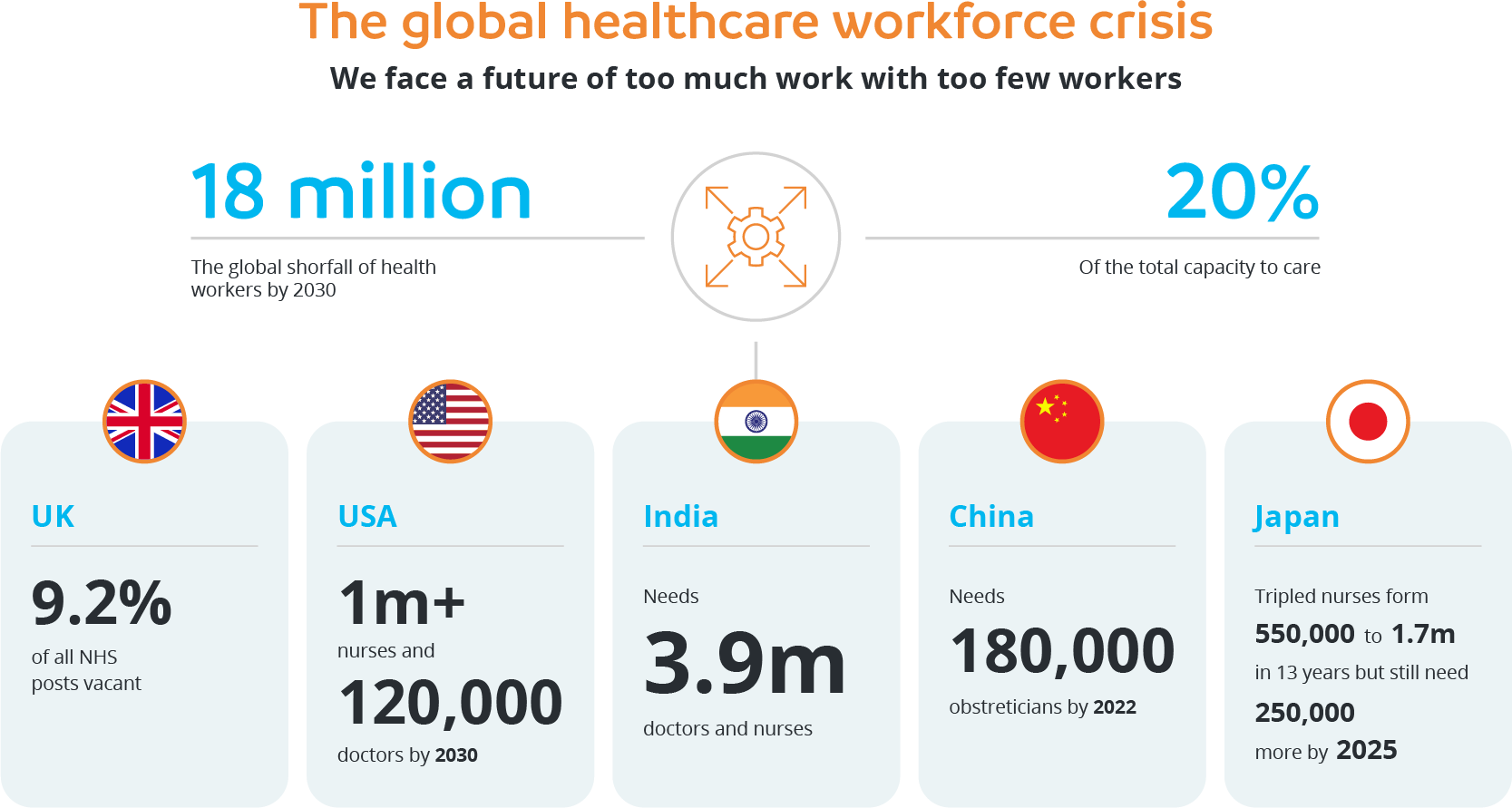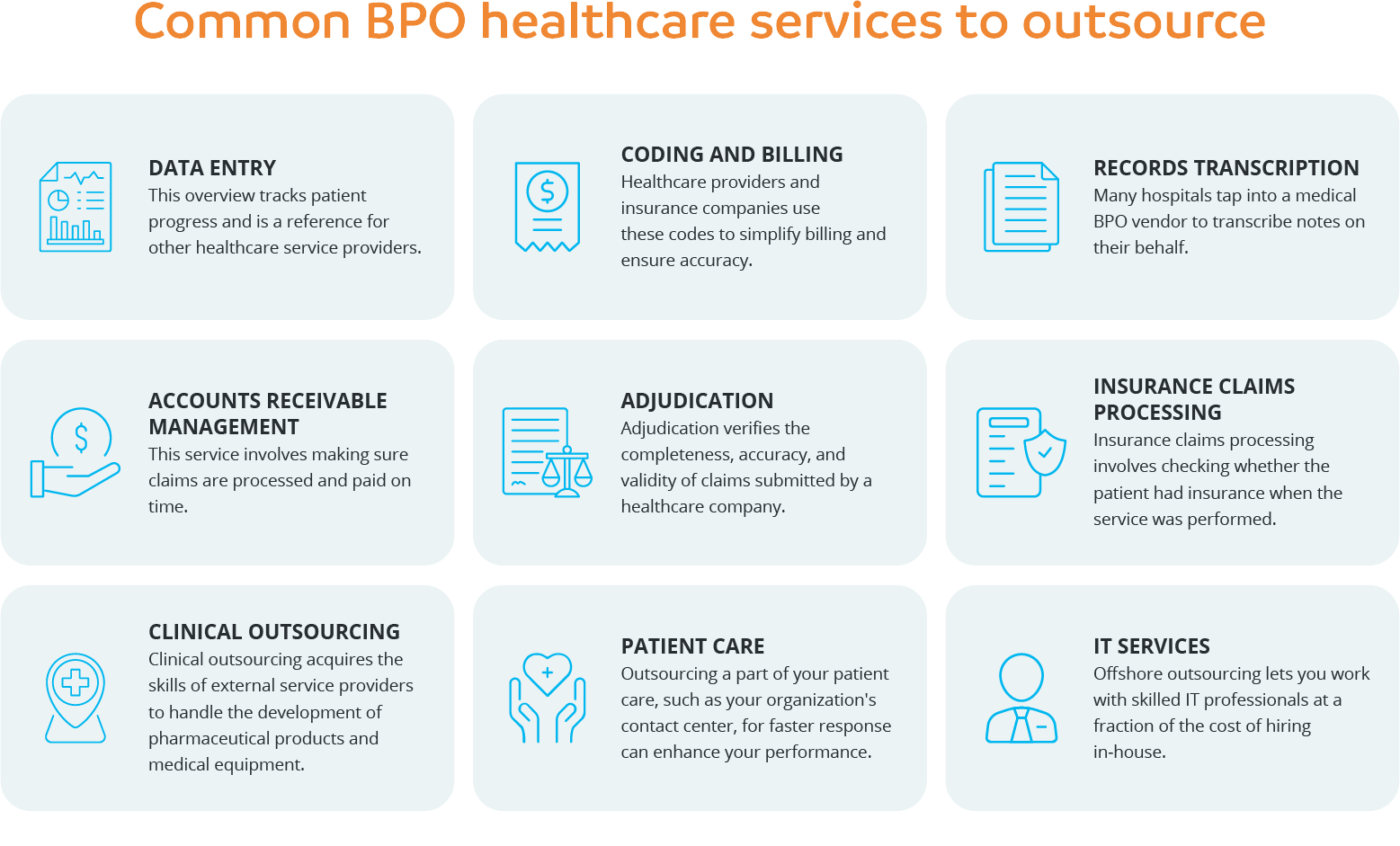Why healthcare outsourcing is on the rise

For more than two decades, Black Book Research has earned a reputation for having its finger on the pulse of the healthcare sector. Recognized as a Top 25 international market research niche firm, it prides itself on conducting surveys that tap into the visions, challenges and concerns of the United State’s largest hospitals, top insurers and leading technology firms1.
When Black Book releases a finding, healthcare leaders tend to listen and that certainly would have been the case in the wake of its recent 20th annual outsourcing services survey.
“Healthcare’s outsourcing boom is on a trajectory to double by 2027,” Black Book declared in a media release trumpeting the latest edition of the survey2.
The study, based on the opinions of nearly 16,000 hospital and physician organizations across 40 categories of managed services, showed that 91% of respondents believe an increasing number of healthcare providers are electing to deflect mounting solution delivery concerns to outsourcing vendors.
A lack of in-house expertise, the need to keep pace with new technologies and staffing concerns were just a few of the reasons a vast majority of those surveyed believe healthcare will see a dramatic increase in outsourcing during the next five years.
Among an assortment of startling revelations, the study showed3:
- 59% of hospitals with more than 150 beds are moving to outsource non-clinical services;
- 87% of administrators say cash flow problems at smaller hospitals make outsourcing the only viable option;
- 77% of health providers that have outsourced for five or more years report improvements in service delivery by their outsourcing partners;
- 93% of hospital leaders have intensified strategic planning to engage more third-party vendors; and
- The hospital outsourcing market is projected to reach $650 billion by 2027, up from $304 billion in 2022.
In the wake of the survey, Black Book President Doug Brown said an outsourcing strategy could help healthcare organizations solve critical staffing challenges, develop scalable resilient systems and deliver an outstanding patient experience.
“Outsourcing can be a potential resource-saver as providers are stressed with understaffed teams and seemingly endless cycles of maintaining software and equipment,” he said.
“By delegating non-core functions to external service providers, physician organizations and hospitals can concentrate on their patient-centric competencies and strategic priorities.”
While outsourcing has long been popular in many sectors, the healthcare industry was initially reluctant to embrace the strategy. That has changed in recent times though, with more than 90% of U.S. hospitals now outsourcing at least one of their processes4. For further insights into why that is the case, read on as we highlight the advantages of healthcare outsourcing and roles that can benefit from a helping hand.

Source: The healthcare workforce of the future: a global perspective (digitalhealth.gov.au)
What is outsourcing in healthcare?
Outsourcing in healthcare is a resourcing strategy that involves clinical and non-clinical tasks being handled by external providers. Designed to ease pressure on hospitals and health services, it sees qualified teams or individuals oversee the likes of medical billing and coding, transcription, human resources and patient services and allows in-house staff to dedicate more time and resources to patient care.
Hospital outsourcing opportunities
For healthcare operators still weighing up the outsourcing option, these opportunities are hard to ignore.
- Reduced costs: at a time when health leaders are under increasing pressure to identify cost savings, outsourcing is an obvious choice. Partnering with a provider in offshore destinations such as the Philippines can save up to 70% on labor costs alone, while there is also less need to outlay on expenses related to recruitment, training, onboarding and infrastructure.
- Better patient care: nothing matters more in healthcare than the wellbeing of patients and outsourcing allows health services to keep that top of mind. With repetitive and time-consuming tasks such as claims processing and medical transcription handled by external providers, clinical staff can spend more time caring for patients and improving outcomes.
- Data management: the modern health sector relies on the safe, secure and accurate collection of data, from test results and medical records to insurance applications. The problem comes when under-resourced staff find themselves overworked and at increasing risk of delays and making mistakes. Outsourcing eases this burden by blending committed staff with leading technology to ensure data management is given the importance it deserves.
- Technology solutions: remember when health records were captured on paper and filed in dusty back offices? Those days are long gone, with electronic medical records at the heart of the modern healthcare sector. That evolution has increased the need for best-practice technology solutions and, in turn, offshore providers are investing heavily in cutting-edge digital solutions to meet their clients’ needs. Outsourced IT support is another valuable resource for hospitals.
- Revenue cycle management (RCM): while patient care is all-important, today’s health providers are also businesses that require seamless and accurate systems for managing revenue. Outsourcing RCM is proving a boon for health leaders desperate to ensure the likes of patient registration, insurance verification and claims submissions are handled with not only care but speed.

Source: A Comprehensive Guide to Healthcare Outsourcing | Unity Connect (unity-connect.com)
Hospital outsourcing challenges
As 2024 gathers pace, there are several challenges that hospitals may encounter in the world of healthcare outsourcing.
- Complex regulatory and legal framework: health services looking to outsource need to ensure they and their outsourcing partner adhere to regulatory and legal frameworks, which can be difficult given their ever-evolving nature. It is essential to stay abreast of patient confidentiality rules, compliance with relevant laws and management of contracts with external providers.
- Risk management: outsourcing means handing control of quality and standards to an external provider, along with trusting they will adhere to strict confidentiality and data security requirements. Along with partnering with a respected and proven provider, hospitals should employ robust risk management processes and contingency plans to minimize the potential for negative results.
- Meeting patient needs: healthcare organizations that embrace outsourcing need to ensure their chosen partner is as committed to delivering for their patients and stakeholders as they are. Establishing clear KPIs and goals, employing clear communication channels and conducting regular reviews are just three ways for hospitals and health services to help align their standards with those of their outsourcing partners.
What healthcare services can be outsourced?
Healthcare roles and tasks can be outsourced include:
- Medical coder
- Medical coding trainer
- Quality assurance supervisor
- Quality assurance manager
- Medical transcriptionist
- Medical claims processor/analyst
- Medical billing specialist
- Quality assurance specialist
- Chart retrieval specialist.
Outsourcing opportunities also exist across areas as diverse as:
- Patient scheduling and follow-up
- Information technology (cybersecurity, systems design for digital transformation, data management)
- Customer care (including contact centers)
- Compliance management
- Finance and accounting
- Human resources
- Sales
- Marketing.
Summary
It is one thing to know outsourcing is a valuable resource for hospitals and health services. It is another for those operators to find the best outsourcing partner for their needs. One size does not fit all and that is why anyone considering outsourcing should take their time, research extensively, seek testimonials and ask plenty of questions. Quality providers will not only have little trouble answering such queries but welcome the opportunity to showcase their credentials.
As hospitals continue to bounce back from what was described as “the worst operating year we’ve ever seen”5, effective revenue cycle management has never been more important for healthcare executives. Learn how outsourcing RCM can result in better collection rates, denial resolution efficiency and revenue growth.
Reference:
[1] About Black Book's Business Research Divisions - Black Book Market Research
[2] Healthcare’s Outsourcing Boom on a Trajectory to Double by 2027, Black Book 20th Annual Industry Study | Company Newsroom of Black Book Market Research (newswire.com)
[3] Healthcare’s Outsourcing Boom on a Trajectory to Double by 2027, Black Book 20th Annual Industry Study | Newswire
[4] Healthcare IT Outsourcing & How It Works (plexteq.com)
[5] Hospitals faced 'worst operating year' ever in 2022: Fitch (beckershospitalreview.com)
Popular posts
Browse by topic
- Accounting
- Accounting & Finance
- All Industries
- Banking
- BPO/RPO/HRO
- Communication
- CSR & ESG
- Customer & Client Acquisition
- Customer Experience
- Cybersecurity
- Cybersecurity & Compliance
- Data Management
- Digital Operations
- Digital Transformation
- eCommerce
- Education
- Employee Engagement
- Engineering & Construction
- Financial Services
- Healthcare
- Hospitality and tourism
- HR & Recruitment
- Information Technology
- Insurance
- Legal Services
- Logistics
- Offshoring & Outsourcing
- Outsourcing
- Professional Services
- Real Estate
- Retail & eCommerce
- Startups
- Talent Acquisition and Retention
- Technology
- Trends & Guides
- Workforce Integration
Related Posts
How employers can reduce healthcare costs
A lot has been written about how the working world has changed in the wake of the COVID-19 pandemic. Where many managers once linked productivity..
Defining data – the difference between data privacy, data security and data protection
There is no shortage of issues that can inspire sleepless nights for business leaders. Talent shortages, regulatory pressures, shrinking budgets and..
Finding value in partnerships: evaluating offshore providers for healthcare cost management
Academic journal The Conversation did not hold its punches when it recently turned its attention to a crisis engulfing the healthcare sector. Beneath..
